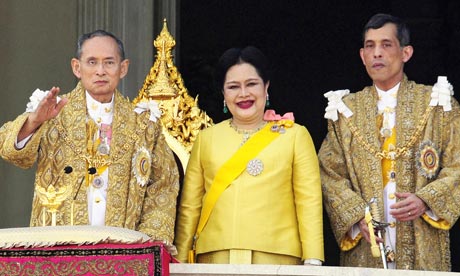
A government minister in Thailand has warned Facebook users that anyone pressing the "like" button on posts that might be offensive to the monarchy could be prosecuted under the country's strict lèse-majesté laws.
The warning was given two days after a Thai criminal court sentenced Amphon Tangnoppaku, 61, to 20 years in prison for sending text messages deemed insulting to the country's queen.
Amphon was found guilty on four counts and sentenced to five years' consecutive jail on each charge.
Thailand's laws against lèse-majesté (insulting a monarch) are the most severe in the world. Even repeating the details of an alleged offence is illegal.
A report in the Bangkok Post quoted the information technology minister, Anudith Nakornthap, saying that anyone who had pressed "like" on items related to lèse-majesté on Facebook should go back and delete all their reactions and comments. Such material could end up being copied by people who set up fake pages to insult the monarchy, he said.
"If they don't delete them, they can end up violating the computer crime act for indirectly distributing inappropriate content," Anudith said.
The court heard Amphon sent offensive text messages in May 2010 to a personal secretary of Abhisit Vejjajiva, who was prime minister. Amphon denied the charges, saying he was unfamiliar with the text message function on mobile phones and did not know the recipient of the message.
Thailand's government has been forced to take a tough line on lèse-majesté after being portrayed by the opposition as soft on those who break the law.
Arrests and convictions spike during times of instability, when the law is used by political rivals to harass opponents. That has been the case since a 2006 military coup ushered in political upheaval and sporadic street violence.
Statistics obtained by the Associated Press from Thailand's office of the attorney general show 36 cases were sent for prosecution in 2010, compared with 18 in 2005 and one in 2000.
The US state department has said it respects the Thai monarchy and judicial system but "people around the world should be afforded freedom of expression".
Benjamin Zawacki of Amnesty International condemned Wednesday's verdict, accusing the government of suppressing freedom of expression.
"Thailand has every right to have a [lèse-majesté] law but its current form and usage place the country in contravention of its international legal obligations," Zawacki told the Associated Press. "Repression remains the order of the day in Thailand on freedom of expression and Amphon is a political prisoner."
Before his arrest, Amphon had lived with his wife, daughter-in-law and three grandchildren in a rented room in Samut Prakan province, on the outskirts of Bangkok. He is retired and received a 3,000-baht (£62) monthly allowance from his children. He has mouth cancer and has required regular medical care since 2007.

No comments:
Post a Comment